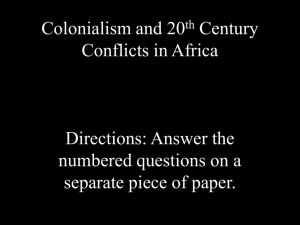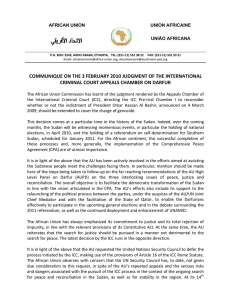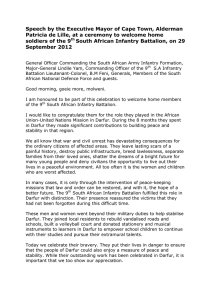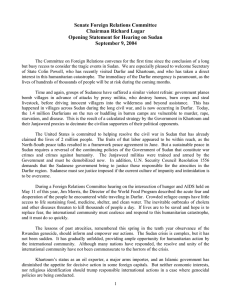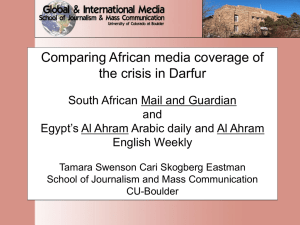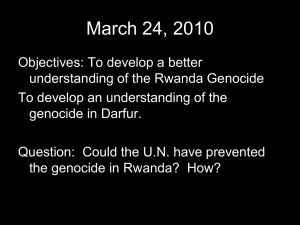africa study guide - Mustang Public Schools
advertisement
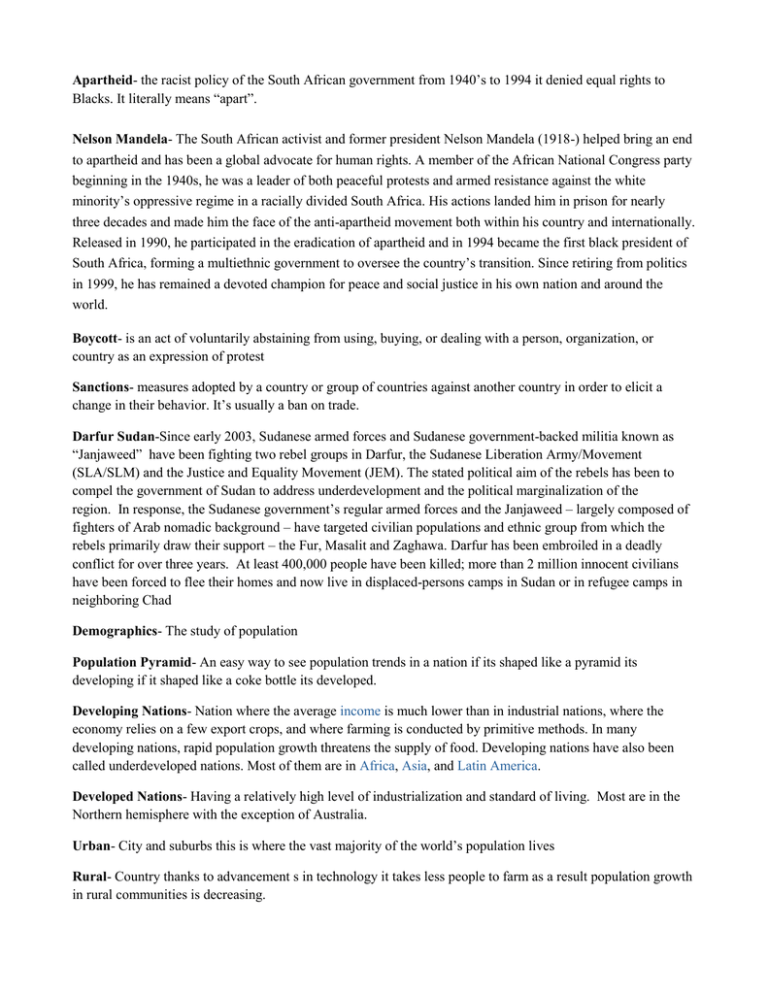
Apartheid- the racist policy of the South African government from 1940’s to 1994 it denied equal rights to Blacks. It literally means “apart”. Nelson Mandela- The South African activist and former president Nelson Mandela (1918-) helped bring an end to apartheid and has been a global advocate for human rights. A member of the African National Congress party beginning in the 1940s, he was a leader of both peaceful protests and armed resistance against the white minority’s oppressive regime in a racially divided South Africa. His actions landed him in prison for nearly three decades and made him the face of the anti-apartheid movement both within his country and internationally. Released in 1990, he participated in the eradication of apartheid and in 1994 became the first black president of South Africa, forming a multiethnic government to oversee the country’s transition. Since retiring from politics in 1999, he has remained a devoted champion for peace and social justice in his own nation and around the world. Boycott- is an act of voluntarily abstaining from using, buying, or dealing with a person, organization, or country as an expression of protest Sanctions- measures adopted by a country or group of countries against another country in order to elicit a change in their behavior. It’s usually a ban on trade. Darfur Sudan-Since early 2003, Sudanese armed forces and Sudanese government-backed militia known as “Janjaweed” have been fighting two rebel groups in Darfur, the Sudanese Liberation Army/Movement (SLA/SLM) and the Justice and Equality Movement (JEM). The stated political aim of the rebels has been to compel the government of Sudan to address underdevelopment and the political marginalization of the region. In response, the Sudanese government’s regular armed forces and the Janjaweed – largely composed of fighters of Arab nomadic background – have targeted civilian populations and ethnic group from which the rebels primarily draw their support – the Fur, Masalit and Zaghawa. Darfur has been embroiled in a deadly conflict for over three years. At least 400,000 people have been killed; more than 2 million innocent civilians have been forced to flee their homes and now live in displaced-persons camps in Sudan or in refugee camps in neighboring Chad Demographics- The study of population Population Pyramid- An easy way to see population trends in a nation if its shaped like a pyramid its developing if it shaped like a coke bottle its developed. Developing Nations- Nation where the average income is much lower than in industrial nations, where the economy relies on a few export crops, and where farming is conducted by primitive methods. In many developing nations, rapid population growth threatens the supply of food. Developing nations have also been called underdeveloped nations. Most of them are in Africa, Asia, and Latin America. Developed Nations- Having a relatively high level of industrialization and standard of living. Most are in the Northern hemisphere with the exception of Australia. Urban- City and suburbs this is where the vast majority of the world’s population lives Rural- Country thanks to advancement s in technology it takes less people to farm as a result population growth in rural communities is decreasing. Population Density- Number of people per square mile GNP-(Gross National Product) is the sum of all the money produced by people and companies in a country.This value is used in economics to state how rich a country is, compared to other countries. Slums/Shanty Towns-A shanty town (also called a squatter settlement) is a slum settlement (sometimes illegal or unauthorized) of impoverished people who live in improvised dwellings made from scrap materials: often plywood, corrugated metal and sheets of plastic. Shanty towns, which are usually built on the periphery of cities, often do not have proper sanitation, water supply or aqueduct, electricity or telephone services. Birth Rate-The rate is the number of births per 1,000 people per year Globalization-the development of an increasingly integrated global economy marked especially by free trade, free flow of capital, and the tapping of cheaper foreign labor markets. Basically everyone is becoming western. Desertification- the spreading of the desert Sahel- Means border. It is the area between the Sahara desert and the Savanna. Stretching across Western Africa it is a very dry area. The only people there are nomadic farmers. Nomads are people that move across the Sahel following the rains to keep their goats and cattle alive. Savanna- Landscape of flat grasslands and scattered trees that can survive dry spells Deforestation- Cutting down the rainforest to make room for arable land for farming and development. Also the timber industry is a lucrative business. Arable Land- Land good for farming. There is little arable land in Western Africa. Mercantilism- Economic system sent raw materials from the colonies to Europe where they would then turn those unfinished goods into manufactured goods then sell them back to their colonies. Between 1500-1800 Triangle Trade-the trade between Europe, Africa, and North America 1500-1800 The Middle Passage- was the stage of the triangular trade in which millions of people from Africa were shipped to the New World as part of the Atlantic slave trade. Ships departed Europe for African markets with manufactured goods, which were traded for purchased or kidnapped Africans, who were transported across the Atlantic as slaves; the slaves were then sold or traded for raw materials, which would be transported back to Europe to complete the voyage. 12 to 15 million Africans were taken as slave from 1500-1800. The Berlin conference 1885- Is important because it divided Africa up between European powers with little regard to tribal differences. The lines they drew in Berlin 1885 would eventually become nations. Most of countries in Africa would not get their independence until after World War Two. Colonialism- Policy when one country seeks to rule other areas. Imperialism. - The policy of creating an empire by taking over other areas is also often called imperialism. European countries had colonized nearly all of Africa by 1900. This meant African people were not free to rule themselves or even decide where their borders were. Only after WWII in the 1950’s did most African nations gain their independence and freedom. Infrastructure- The body of public works such as roads bridges, and hospitals a country needs to support a modern economy Subsistence Farming-farming that provides for the basic needs of the farmer without surpluses for marketing. You only make enough food for you and your family. Governments that have a large amount of subsistent farmers cannot tax them so therefore they cannot build the infrastructure needed to become developed. African Union- Was formed to promote unity among African nations and to foster development and end poverty. It promotes democracy, peace keeping mission, women’s rights, development of infrastructure and education. Microcredit is the extension of very small loans to impoverished borrowers who typically lack collateral, steady employment and a verifiable credit history Communism- The government owns all businesses and companies Capitalism- Economic theory stating that a person is free to buy, sell, trade, or own anything they want without government interference. It is the principal of a Free Market Economy. Why move to cities?- Thanks to advancements in technology it takes less people to farm as a result population growth in the rural community is decreasing.. Cities provide more jobs.. Cities have better health care and better educational opportunities. This cartoon show globalization is spreading western culture and destroying native cultures. It appears the artist has a negative view of globalization The United Nations (UN) is an international organization whose stated aims are to facilitate cooperation in international law, international security, economic development, social progress, human rights and achieving world peace. The UN was founded in 1945 after World War II to replace the League of Nations, to stop wars between countries and to provide a platform for dialogue. It’s in New York Tanzania and Kenya have some of Africa’s most tourist sites they include Mount Kilimanjaro, The Serengeti plain, Lake Victoria David Livingstone explored more of Africa than anyone else spreading Christianity and fighting against the slave trade. His heart is still there but his body rest in Westminster Abby. While exploring the Zambezi River he found Victoria Falls. He later found new parts of the Congo a river which run the rainforest. He also found the Lake Victoria which he concluded with Speke was the source of the Nile the longest river in the world. When Morton Stanley finally found him he said “Dr. Livingstone I presume”. Based on the population pyramid above what conclusion can we draw about Sudan’s? Sudan has a poor health care system because there are few elderly people in the country and Sudan is a developing country we know this because they have huge population growth Shaka Zulu- united most of South Africa under his rule. He was the most powerful of all African Chieftains Below is an example of relative location Liberia- was created by African Americans and was very stable until the 1980’s when civil war began leading to a war in Sierra Leon and a civil war. The Human Development Index- This ranks countries based on the countries life expectancy, education, and other factors Why are there pirates in Somalia? It’s located on the Horn of Africa, Chinese fisherman have depleted the fish, and the government is so weak they cannot enforce laws The climate graph show that the DRC has a dry season in the summer and farmers must plant their crops according to coincide with rain in the spring and fall. In Rwanda in period of 3 month Hutu militia killed nearly 1 million Tutsi
